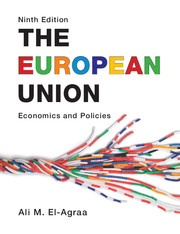Book contents
- Frontmatter
- Contents
- Figures
- Tables
- Boxes
- Contributors
- Preface
- A reader’s guide
- Abbreviations
- 1 General introduction
- Part I EU history, institutions and legal dimension
- Part II EU market integration
- Part III EU monetary integration
- Part IV The single European market
- Part V EU budget and structural policies
- 19 The general budget
- 20 The Common Agricultural Policy
- 21 The Common Fisheries Policy
- 22 Regional policy
- 23 Social policies
- Part VI EU external relations
- Part VII The future of the EU
- Bibliography
- Author Index
- Index
- References
19 - The general budget
from Part V - EU budget and structural policies
- Frontmatter
- Contents
- Figures
- Tables
- Boxes
- Contributors
- Preface
- A reader’s guide
- Abbreviations
- 1 General introduction
- Part I EU history, institutions and legal dimension
- Part II EU market integration
- Part III EU monetary integration
- Part IV The single European market
- Part V EU budget and structural policies
- 19 The general budget
- 20 The Common Agricultural Policy
- 21 The Common Fisheries Policy
- 22 Regional policy
- 23 Social policies
- Part VI EU external relations
- Part VII The future of the EU
- Bibliography
- Author Index
- Index
- References
Summary
Introduction
The general budget of the EU (EU budget) has always been an issue of high political salience. Member states (MSs) are naturally concerned with their contributions to and receipts from it. Until 1988 the political significance of the EU budget was also heightened by inter-institutional rivalry within the European Community (EC). The right to approve the EU budget, one of the more significant powers of the European Parliament (EP), was used as a lever to force concessions from the Council (see Chapter 3). This problem has been resolved by gradually increasing EP powers by making it more directly involved in EU budgetary planning.
The EU budget is also a window on the EU as a political and economic institution. In the early years the EU budget was very small and financed from national contributions. With the development of EU policies, in particular the Common Agricultural Policy (CAP; see Chapter 20), expenditure rose and ‘own resources’ were introduced in 1970. There followed a period of expenditure growth, principally on agriculture. The late 1970s and early 1980s were plagued by disagreements over the EU budget between the institutions and in relation to the UK’s contribution. The resolution of this British problem was accompanied by measures to control agricultural expenditure, and was one of the factors that facilitated the development of the Single European Market (SEM; see Chapters 2 and 7). The SEM and the EU’s Mediterranean enlargement led in 1988 to the Delors I budgetary package. This was a comprehensive revision of the EU budget which increased expenditure (European Council 1988). Following agreement on the Treaty on European Union (TEU), the budget was further modified by the Edinburgh Agreement (European Council 1992b), the Delors II package. This was accompanied by a radical CAP reform and further expanded budgetary resources to accommodate more expenditure on structural policies, internal policies (particularly research) and on external action, recognizing the impact of the changes in Central and Eastern Europe. The reduced dynamism in the EU in the second half of the 1990s is reflected in budgetary developments. Thus it took eight years to agree relatively modest financial resources for enlargement (European Council 2005a).
- Type
- Chapter
- Information
- The European UnionEconomics and Policies, pp. 289 - 305Publisher: Cambridge University PressPrint publication year: 2011
References
- 1
- Cited by



